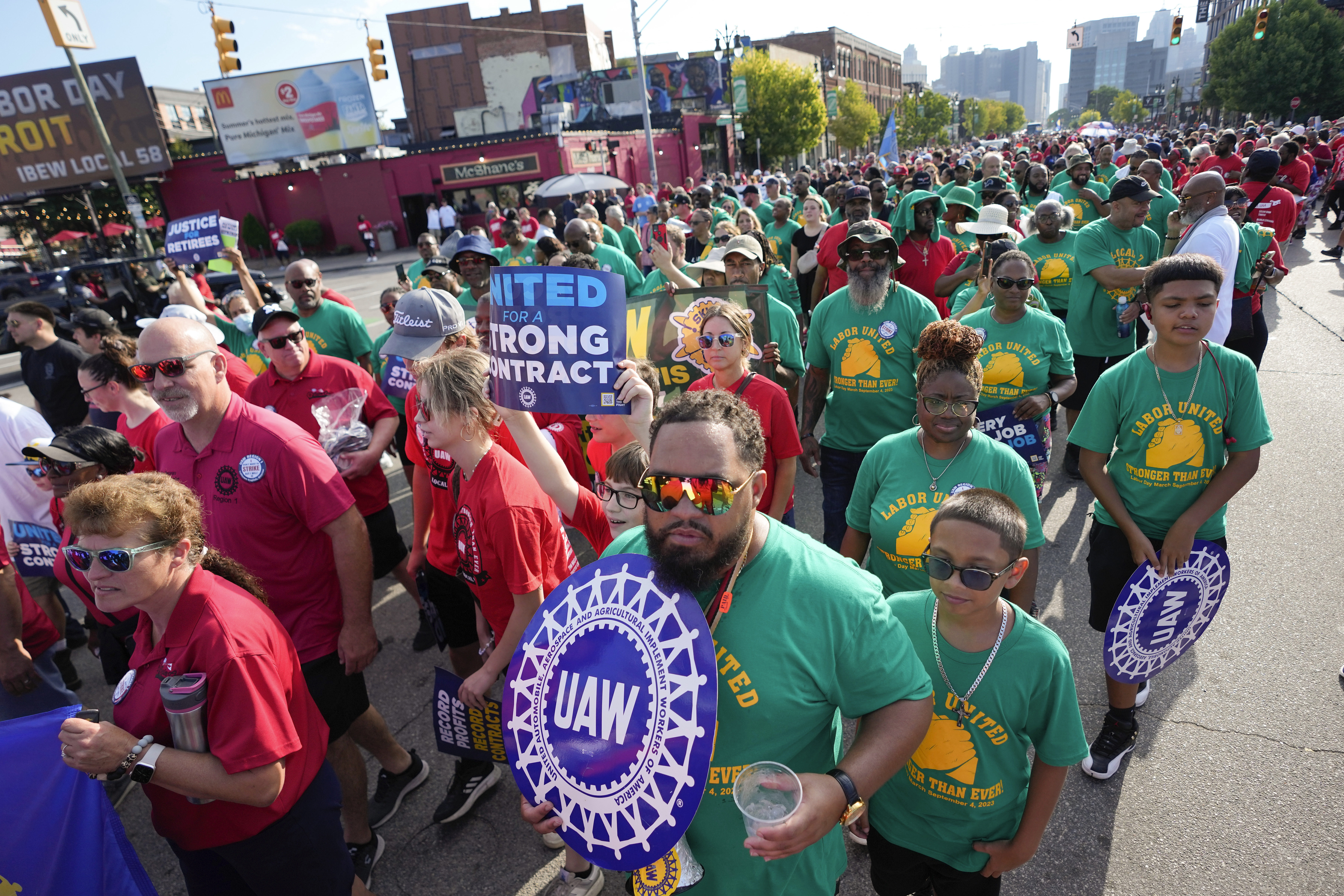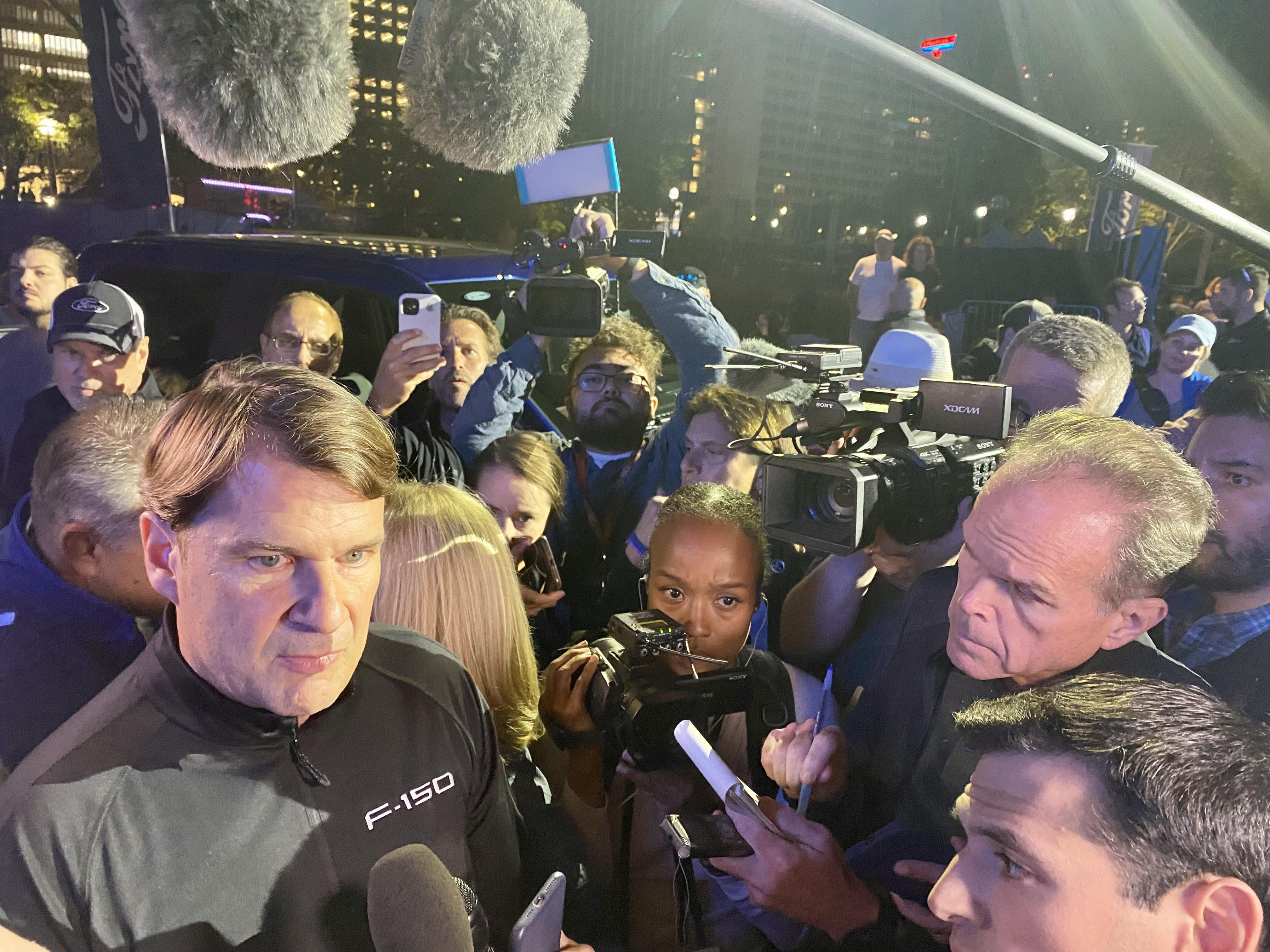With less than 24 hours left before a strike deadline, United Auto Workers President Shawn Fain said Wednesday that offers from the companies aren't enough and the union is getting ready to strike.
In an online address to union members, Fain said General Motors, Ford and Stellantis have raised their initial wage offers, but have rejected some of the union's other demands.
“We do not yet have offers on the table that reflect the sacrifices and contributions our members have made to these companies,” he said. “To win we're likely going to have to take action. We are preparing to strike these companies in a way they've never seen before.”
The union is threatening to strike after contracts with companies that haven't reached an agreement by 11:59 p.m. on Thursday. But the strikes would be targeted to a small number of factories per company. It would be the first time in the union's 80-plus-year history that it struck all three companies at the same time.
Get top local stories in San Diego delivered to you every morning. >Sign up for NBC San Diego's News Headlines newsletter.
Talks continued Wednesday with the companies, but it appeared that both sides are still far apart.
Automakers contend that they need to make huge investments to develop and build electric vehicles while still building and engineering internal combustion vehicles. They say an expensive labor agreement could saddle them with costs that would force them to raise prices above their non-union foreign competitors. And they say they have made fair proposals to the union.
Questioned Wednesday night after an appearance at the Detroit auto show, a frustrated Ford CEO Jim Farley said if the union strikes Ford, it’s not the company’s fault because it has made four offers and hasn’t gotten a “genuine counteroffer.”
“It’s hard to negotiate a contract when there’s no one to negotiate with,” Farley said, wondering out loud whether Fain was too busy planning strikes or events aimed at getting publicity.
The company, he said, has made a generous wage offer, eliminated wage tiers, restored cost of living pay increases and increased vacation time. The union disputes his contention that tiers were ended.
“It was fully competitive with all of the UAW-negotiated settlements, sometimes after strikes, with other industrial companies. And we heard nothing,” Farley said.
But he said there is still time to reach an agreement before the deadline.
Fain said the final decision on which plants to strike won’t be made until Thursday night and will be announced at 10 p.m. Eastern time.
The union president said it is still possible that all 146,000 UAW members could walk out, but the union will begin by striking at a limited number of plants.
“If the companies continue to bargain in bad faith or continue to stall or continue to give us insulting offers, then our strike is going to continue to grow,” Fain said. He said the targeted strikes, with the threat of escalation, “will keep the companies guessing.”
The union will not extend contracts, so those who stay at work will do so with an expired agreement. Fain said he understands sentiment behind an all-out strike, which is still possible. But he said the targeted-strike strategy is more flexible and effective.
If there’s no deal by the end of Thursday, union officials will not bargain on Friday and instead will join workers on picket lines, he said.
The UAW started out demanding 40% raises over the life of a four-year contract, or 46% when compounded annually. Initial offers from the companies fell far short of those figures. The UAW later lowered its demand to around 36%.
In addition to general wage increases, the union is seeking restoration of cost-of-living pay raises, an end to varying tiers of wages for factory jobs, a 32-hour week with 40 hours of pay, the restoration of traditional defined-benefit pensions for new hires who now receive only 401(k)-style retirement plans, pension increases for retirees and other items.
On Wednesday, Fain said the companies upped their wage offers, but he still called them inadequate. Ford offered 20% over 4½ years, while GM was at 18% for four years and Stellantis was at 17.5%. The raises barely make up for what he described as minimal raises of the past. In a 2019 agreement the union got 6% pay raises over four years with lump sums in some years as well as profit-sharing checks.
Top pay for an assembly plant worker is now $32 per hour.
All three companies’ offers on cost-of-living adjustments were deficient, he said, providing little or no protection against inflation, or annual lump sums that many workers won’t get.
The companies rejected pay raises for retirees who haven’t receive one in over a decade, Fain said, and they are seeking concessions in annual profit-sharing checks, which often are more than $10,000.
In a statement, Stellantis said it gave the union a third wage-and-benefit offer and is waiting for a response.
“Our focus remains on bargaining in good faith to have a tentative agreement on the table before tomorrow’s deadline,” Tobin Williams, the company’s head of human resources in North America, said in a statement. “The future for our represented employees and their families deserves nothing less.”
GM said in a statement that it continues to bargain in good faith, making “additional strong offers.” The company reported progress including guaranteed annual wage increases and investment, investing in U.S. factories and shortening the number of years for employees to make top wages.
Farley, the Ford CEO, said in a statement that his company has made four “increasingly generous” offers since Aug. 29. “We still have not received any genuine counteroffer,” he said.
Farley said Ford has raised its wage offer, eliminated wage tiers and shortened from eight years to four years the time it would take hourly workers to reach top scale, and added more time off.
Thomas Kochan, a professor of work and employment at the Massachusetts Institute of Technology, said both sides are going to have to make big compromises quickly in order to settle the disputes before the Thursday deadline.
“It’ll go down to the wire, and there won’t be an agreement until the final moment, if there is one at all,” he said.
The union, he said, knows its initial proposals weren’t realistic for any of the companies, but the companies know they’re going to have to make a very expensive settlement, including addressing tiered wages for people doing the same jobs.
With Fain in charge of the union, the negotiations have been the most public in U.S. history, he said, putting pressure on both sides to reach an agreement.
____
Koenig reported from Dallas.



